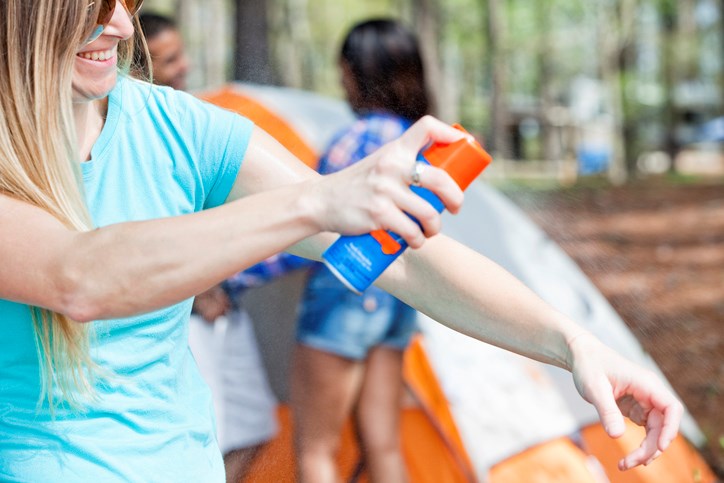Annoying, sometimes dangerous, and always a nuisance, mosquitoes live to ruin our summers. Prevention is the best buzz kill, which is why Health Canada-approved DEET options with long-lasting coverage are advised.
Here’s what we know about these tiny menaces: only females bite. They are attracted to scent and carbon dioxide. They consume blood until they are full. There’s no limit to how much one can bite. They thrive in wet, warm weather. Nobody likes them.
But what can we do about it? Are we just destined to be a human smorgasbord at every barbecue, picnic and camping trip?
HOW TO PREVENT MOSQUITO BITES
You can take preventative steps to lessen the likelihood of a bite, like covering up arms and legs in loose fabric, wearing socks and shoes at all times, and using netting when sitting or sleeping outside (an essential point for children).
While thousands of mosquito products make big promises, Health Canada (which regulates approved PCPs — pest control products) does not vouch for the safety of clever but unproven products like zappers, wearable pieces (bracelets and bracelets) watches), sonic devices and traps.
There is a mix of safe recommendations on the , including a list of essential oils like lemon and pine needles found in this recommended . Health Canada also has detailed information on DEET, including dosage by age and length of use recommendations.
ARE DEET MOSQUITO REPELLENTS SAFE?
DEET may be a scary-sounding chemical, but it's widely tested and stringently regulated. Per this , most of the dangers around DEET come from misusage (like ingesting it) and murky reports of illness and death with no scientific evidence.
Going by the Health Canada guidelines, adults (and kids over 12) are safe with products with up to 30% DEET, like the top-rated — an affordable and widely available option. It’s not pretty, and it doesn’t smell like a soy candle, but it is effective and safe (with a Health Canada-regulated PCP number). This particular formula can also be sprayed directly onto the outside of clothing (focus on cuffs and hemlines) for extra protection.
This is at the top of the DEET-metre at 30%, and users love the scentless formula and the ability to control exactly where it goes and how much is applied to more vulnerable areas like wrists and ankles.
Health Canada doesn’t recommend wearable bug protection, citing a lack of protection, but are DEET-free, waterproof and purport to offer 350 hours of protection per bracelet. Using citronella, lemongrass and geraniol, hundreds of Amazon users give them a four-star rating but scientists are dubious about the effectiveness of wearable mosquito-repellent accessories.
The high-tech answer to defeating mosquitoes
Most people hate mosquitoes for good reason: the bites are itchy and they are the deadliest animal in the world. Covering up and using repellent are two ways to help but there's also a growing interest in items like the , a rechargeable, flame-less, oil-free and scentless device that purports to create a 15-foot "mosquito free" zone. $69.99 at .
How to soothe an itchy mosquito bite
So you've been bit - now what? The "as seen on social media" which, depending on which review you believe, work miracles or are just a placebo sticker. These kid-friendly grid stickers purport to immediately bring down swelling and help with lymphatic drainage and flush out insect saliva.


